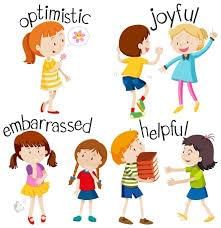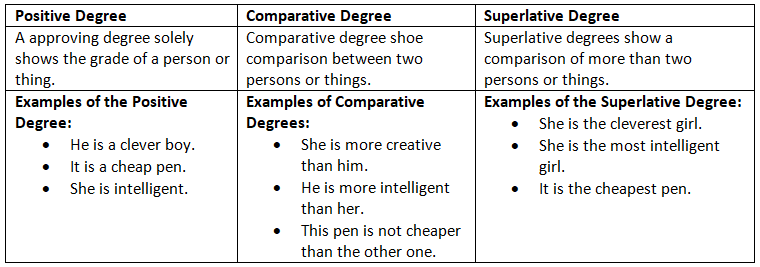English Grammar - Adjectives | English Grammar for Junior Classes - Class 1 PDF Download
| Table of contents |

|
| Adjective |

|
| Types of Adjective |

|
| Five basic kinds of Adjectives: |

|
| Degree of Adjective |

|
Adjective
An adjective is a word that tells us more about a noun. It “qualifies” or “modifies“ a noun.
Examples:
- Meena is wearing a sleeveless dress today.

- Amit is a naughty baby.

- She writes meaningless letters.
- This shop is much nicer.
- This dal is not edible.
Types of Adjective

Five basic kinds of Adjectives:
1. Adjective of Quality
- An adjective used in the sentence to indicate the size, shape, and color of a person, thing, animal, or place is known as an adjective of quality or descriptive adjective. Adjectives that provide a description of a noun are descriptive adjectives.
- Examples of the Adjective of Quality:
- Happy
- Foolish
- Heavy
- Excited
- Late
2. Adjective of Quantity
An adjective of quantity is used to describe how much of something is referred to. These adjectives answer the question ‘How much?’ and refer to an uncountable amount. They describe the amount of something without stating the exact number.
Examples are Given Below:
- Some
- Any
- Enough
- Sufficient
- Whole
3. Demonstrative Adjective
A demonstrative adjectives always come before the noun. It identifies the noun by indicating whether it is near or far.The examples of demonstrative adjectives are this, these, that and those.
Examples of the Demonstrative Adjectives are Given Below:
- Give me that red water bottle.
- I can’t forget that incident.
- I can’t give you that item at this moment.
4. Interrogative Adjective
A simple medium of an interrogative is asking a question. An interrogative adjective is also called an interrogative determiner.
Examples: Interrogative adjectives include which, what, and whose. Interrogative adjectives qualify nouns and are used in interrogative judgments.
- Why have they not reached yet?
- What kind of music do you like?
5. Possessive Adjectives
An adjective that modifies a noun by indicating who owns or has possession of it is called a possessive adjective.
Examples:
- Your child isn't doing well in school.
- We're concerned about his interpretation.
Degree of Adjective
There Are Three Degrees of Adjectives:
|
18 videos|189 docs|31 tests
|
FAQs on English Grammar - Adjectives - English Grammar for Junior Classes - Class 1
| 1. What are adjectives and how do they modify nouns? |  |
| 2. Can adjectives be used to compare nouns? |  |
| 3. How can adjectives be classified based on their function? |  |
| 4. Can adjectives be used in a sentence without a noun? |  |
| 5. How can adjectives be used to make writing more engaging and descriptive? |  |
















